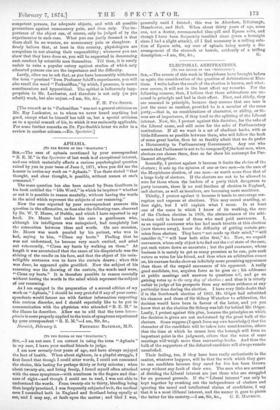APHASIA.
[To THE EDITOR OF THE "SPECTATOR."]
SIR,—The ease of aphasia mentioned by your correspondent "B. E. ff." in the Spectator of last week is of exceptional interest, and one which materially affects a curious psychological question raised by you in your issue of June 3, 1871, when you did me the honour to notice my work on "Aphasia." You there stated "that thought, and clear thought, is possible, without names at one's command."
The same question has also been raised by Dean Goulbarn in his book entitled the "Idle Word," in which be inquires" whether er not it is possible to reason mentally, without having the words in the mind which represent the subjects of our reasoning."
Now the case reported by your correspondent answers this question in the affirmative, as does also the following case, observed by Dr. W. T. Moore, of Dublin, and which I have reported in my boo-k. Dr. Moore had under his care a gentleman who, although his intelligence was unimpaired, had completely lost the connection between ideas and words. On one occasion, Dr. Moore was much puzzled by his patient, who was in bed, saying to him, "Clean my boots." Finding that he was not understood, he became very much excited, and cried out vehemently, "Clean my boots by walking on them." At length it was ascertained that the cause of his disquietude was the shining of the candle on his face, and that the object of his unin- telligible sentences was to have the curtain drawn ; when this was done, he appeared quite gratified. Now the subject of his reasoning was the drawing of the curtain, the words used were, "Clean my boots." It is therefore possible to reason mentally without having the words in the mind which represent the subject a our reasoning.
As I am engaged in the preparation of a second edition of my work on "Aphasia," I should be very grateful if any of your corre- spondents would favour me with further information respecting this curious disorder, and I should especially like to be put in communication with the physician who attended "B. E. M." in the illness be describes. Allow me to add that the term hetero- phasia is more properly applied to the train of symptoms experienced by your correpondent "B. E. M."-1 am, Sir, &c.,


































 Previous page
Previous page